英语词源字典
英语词源表

1 ag do/act 做/动43 idio 特殊/个人/专有的2 agr(i/o) field 田地,农田44 insul island 岛3 ann,enn year 年45 it go 行走4 audi hear 听46 ject throw 投掷5 bell war 战争47 juven young 年轻/少6 brev short 短48 lect,leg,lig choose 选/收7 ce(e)d,cess go 行走49 lev raise 举/升8 cept take 拿50 liber free 自由9 cid,cis cut,kill 切,杀51 lingu language 语言10 circ ring 环,圆52 liter letter 文字/字母11 claim,clam cry,shout 喊叫53 loc place 地方12 clar clear 清除,明白54 log speak 言/说13 clud,clus close,shut 关闭55 loqu speak 言/说14 cogn know 知道56 lun moon 月亮15 cord heart 心57 man dwell 居住/停留16 corp(or) body 体58 manu/man hand 手17 cred believe/trust 相信/信任59 mar sea 海18 cruc cross 十字60 medi middle 中间19 cur care 关心/挂念/注意61 memor memory 记忆20 cur(s),cour(s) run 跑62 merg/mers dip/sink 沉/没21 dent tooth 牙齿63 migr remove 迁移22 di day 日64 milit soldier 兵23 dict,dic say 言,说65 mini/min small 小24 dit give 给66 mir wonder 惊奇25 don,do give 给67 miss/mit send 投/送/发26 du two 二68 mob move 动27 duc,duct lead 引导69 mort death 死28 ed eat 吃70 mot move 移动/动29 equ equal 等,均,平71 nomin name 名30 ev age 年龄/寿命/时代(期) 72 nov new 新31 fact,fac do,make 做,作73 numer number 数32 fer bring,carry 带,拿74 onym name 名33 flor,flour flower 花75 oper work 工作34 flu flow 流76 ori rise 升起35 fus pour 灌,流,倾泻77 paci peace 和平/平静36 grad step,go,grade,步/走/级78 pel push 推/逐/驱37 gram write 写/画/文字/图形79 pend/pens 悬挂/称量/花费38 graph 写/画/文字/图形/记录器80 pet seek 追求39 gress go,walk 行走81 phon sound 声音40 habit dwell 居住82 pict paint 画/描绘41 hibit hold 拿,持83 plen full 满/全42hospit guest 客人84plic fold 折/重叠85 pon put 放置127 am 爱86 popul people 人民128 ambul 行/走87 port carry 拿/带/运129 anim 生命/活/心神/意见88 pos put 放置130 anthrop(o) 人/人类89 preci price 价值131 aqu 水90 punct point/prick 点/刺132 arch/archy 统治者/首脑/统治91 pur pure 清/纯/净133 avi 鸟92 rect right/straight 正/直134 bat 打93 rupt break 破135 biblio 书94 sal salt 盐136 brig 战斗/打95 scend/scens climb 爬/攀137 cad/cas 降落/降临96 sci know 知138 cert 确实/确信97 sec/sequ follow 跟随139 chron 时98 sect cut 切割140 cid 降临/降临99 sent/sens feel 感觉141 clin 倾100 sid sit 坐142 cosm(o) 世界/宇宙101 sist stand 站立143 cracy/crat 统治/支持统治人102 son sound 声音144 cub 躺/卧103 spect look 看145 cult 耕/培养104 spir breathe 呼吸146 cycl(c) 圆/环/轮105 tail cut 切割147 dem(o) 人民106 tain/tan/tin hold 握/持/守148 dexter 右107 tect cover 掩盖149 doc 教108 tele far 远150 dom 屋/家109 tempor time 时151 dorm 睡眠110 ten(d/s/t) stretch 伸152 drom 跑111 terr earth/land 土/陆地153 ego 我112 text weave 编织154 err 漫游/走/行113 tract draw 拉/抽/引155 fabl/fabul 言114 un/uni one 一156 feder 联盟115 urb city 城市157 ferv 沸/热116 vac/vacu empty 空158 fict/fig 塑造/虚构117 vad/vas walk/go 行走159 fid 信任118 vari change 160 fil 线119 ven come 来161 flat 吹120 vert/vers turn 转162 flect/flex 弯曲121 vi/via way 路163 flict 打击122 vis/vid see 看164 frag/fract 破/折123 vit life 生命165 frig 冷124 viv live 活166 fug 逃/散125 aer(o) 空气/空中/航空167 fund/found 底/基础126alt高168gam婚姻169 gran 谷物/谷粒211 ped 脚/足170 grav 重212 ped 儿童/小孩171 greg 群/集合213 petr(o) 石172 gyn/gynec(o) 妇女214 phag 吃173 hal 呼吸215 phil(o) 爱174 helic(o) 螺旋216 phob(ia) 怕175 hes/her 粘着217 plex 重叠/重176 ign 火218 polis 城市177 integr 整/全219 prim 第一/最初178 junct 连接/连结220 radic 根179 later 边221 ras/rad 擦/刮180 leg 读222 rid/ris 笑181 leg/legis 法223 rod/ros 咬/啮182 luc 光224 rot 轮/转183 lumin 光225 rud 原始/粗野184 magn(i) 大226 rur/rus 农村185 matr(i)/metro 母227 sat(is/ur) 足/满/饱186 mega 大228 sen 老187 mens 测量229 simil/simul 相似/相同188 ment 心/神/智/思/意230 sol 单独189 min 伸出/突出231 sol 太阳190 misc 混合/混杂232 soph 智慧191 mis(o) 恨/厌恶233 sper 希望192 mon 告诫/提醒/ 234 spers/spars 散/撒193 mon 单独/一个235 splend 发光/照耀194 mur 墙236 stell 星195 mut 变换237 tact/tag 触196 nat 诞生238 the(o) 神197 nav 船239 ton 音198 nect/nex 结/系240 tort 扭199 negr/nigr 黑241 tour 迂回/转200 nihil 无242 trud/trus 推/冲201 noc/nox 伤害243 tut/tuit 监护/看管202 noct(i) 夜244 umbr 阴影203 norm 规范/正规/正常245 ut/us 用204 nutri 营养246 vag 走/漫游205 orn 装饰247 val 强206 par 生/产248 van 空/无207 parl 说/谈249 ver(i) 真实208 past 喂/食250 voc/vok 声音/叫喊209 path(o)/pathy 疾病/疗法251 vol/volunt 意志/意愿210patr(i) 父/祖252volu/volv滚/转序号 词根 词源/意思 序号 词根 词源/意思 1 bar B 小木条 43 neg N 否定 2 bat B 棒子 44 nox=noc N 毒、害 3 bene B 好 45 nav N 舟 4 cidC 落下 46 pull P 拉扯 5 cess /ceed/ced C 走 47 pan P 盘子 6 cip=cept=ceive=cite C 拿48 put P 放下 7 cur C 跑 49 ped P 脚掌/走 8 caneC 手杖 50 pet P 追求/喜爱 ped 9 dot=doct=ductD 说/教/导 51 pat=pact P 拍 10 dict D 说 52 pict P 图画/画 11 dit D 出版 53 pend P 挂、靠 12 futF fuse 流54poseP 放下序号 词根1 sist=st2 nim=nym=nom3 tri4 serve5 riv6 opt7 preci8 alter1 bl2 br3 cl4 cr5 dr6 Dw (down)7 fl8 gl9 gn (know) 10 gr 11 kn 12 pr 13 ph 14 pl 15 qu 16 scgrav gress词源/意思twopater 爸爸samede+man 人民 meter 测量 mouse 肌肉 mount 山 take+in爪子 缩/少/精 瘦/滑 小,微 嘴,鼻 喷洒 挤压站,停留 拉紧,扯紧 摇摆 三/多/穿过 二,双穿/戳/弄破/拉扯 转 拧,乱拧饱/满 写词源/意思 Stand 站Name Three Save 保留 River 沟 选择 price 价值 other 变更吹风/颜色破碎/分裂/产生 合并/集合 叫喊/爬行 坠落/拉扯/拽 低/矮/短 弯曲/飞/流闪耀/光辉 知道 生长/增加 知道/关节 前/首先 说/表达/出现 折/弯腰/说 取,求 看/雕刻/爬升 沉重 前进 词根 di=bi=du patrsim=sym=sem dem mens musc mult tainscr shr sl sm sn spr squ st str sw thr twTr wh wrple gram=graph序号 9 10 11 12 13 14 15 16171819 20 21 22 23 24 25 26 27 28 29 30 31字母中文含义板子跑/走 说 手/做 土/土地 高/大舌头 山/海 生/船棒子 拿/抓 底下/低 落/倒/否 生 呼吸手臂/腿 男/大 否定背包 唱/吵 do 做 说(ph 变) 大线/绳(光线) 坏/男性 不好的东西燃烧地下 火/燃烧连续/长 移动 知道 kn字母 BC(CH) D F G H J K L M N序号 1 2 3 4 5 6 7 8 9 10 1113 fac=fict F 做 55 pot P 罐子 14 fil F 子女 56 Rect= rig R 直立 15 fasc F 斧头/魔力 57 rod=rot=ros R 破/烂/腐败 16 fine F 界限/钱/惩罚 58 rad R 草根/辐射 17 fer F 拿/带 59 rupt R 突,破 18 fest F 触、碰 60 reg R 管理,规则 19 genG 生 61 sult S 跳 20 gest G 表示 62 sess S 坐,说 21 geo G 土地 63 soph S 智慧 22 hale H 强大/呼吸 64 sip S 吸 23 hibit H 拿(h 是 hand) 65 sentS 感觉,送 24 ject J 喷射 66 tend T 延伸 25 junct J 连接 67 text T 课文,编织 26 Lect,lig , leg L 挑,选;说 68 tone T 声调,腔调 27 ling=lang L 语言 69 tutT 教 28 leg L 说、法 70 tor=tort= turb T 拧、转 29 loy L 捆绑 71 tect T 盖子 30 lux=lus=luc L 光 72 tense=dense T 紧、密 31 log L 说 73 viv V 活的 32 ology L 学说 74 vit V 生命 33 min M(mount) 突起 75 vigV 活力 34 miss=mit M 投/扔/抛/丢 76 vict V 胜利 35 Mot= mut =mob M 移动 77 vac V 空 36 mun M 交流 78 Vag=vad=vent V 走37 mat M 垫子/坐垫 79 vidV 分,看 38 mig M 运动/搬迁 80 vis=vid=view V 看 39 met=med M 金属 81 val (wealth) V 价值 40 mine M 矿 82 vary (very) V 转变 41 merc =merch M 商业 83 wag W 走42 natN 生84Common meaningtake ,seize hold ,have sendcarry,bear stand write say ;study look foldstretchleadput,placemake,dowritetell,say walk,go turndraw,dragcome,go seeCommon meaning before away, down between,among against,to into,not one,alone after,upon to,toward nottogether,with not out,beyond back,again forward,for not apart,not above under wrong across,beyond against forwardtogether back outWords 1.precept 2.detain3.intermittent4.offer5.insist6.monograph7.epilogue8.aspect9.uncomplicated10.non-extended 11.reproduction12.indisposed13.over-sufficient 14.mistranscribe15.contradictory 16.proceed 17.versatile 18.contract 19.revenue 20.evidentRootcept capt cap cip tain ten tin mit mis fersist stit st graph gram log loq leg spect spis spic plic plex pl tend tensduct ducepos ponfic fict fect factscribe scriptdict dic doct doc ceed ced cess vers vert vertractven,vent,van,vad vid,vic,view Prefix pre- de- inter- ob- in- mono- epi- ad- un- com-non-ex- re- pro- in- dis- over- sub- mis- trans- contra- pro- con- re- e-of12 13 P Q 平面/手掌 Qu 取得 相似手掌 说 表现 14 R 小草 直立升起 跑/路 旋转/重复15 S 出气 吸气 坐下 16 T 向前去 向上去 turn17 V 胜利/切分 行走/旋转观看 生命/水 18 19W X 水行走(V)看女性20 Y21Z。
从a到z的词源词典
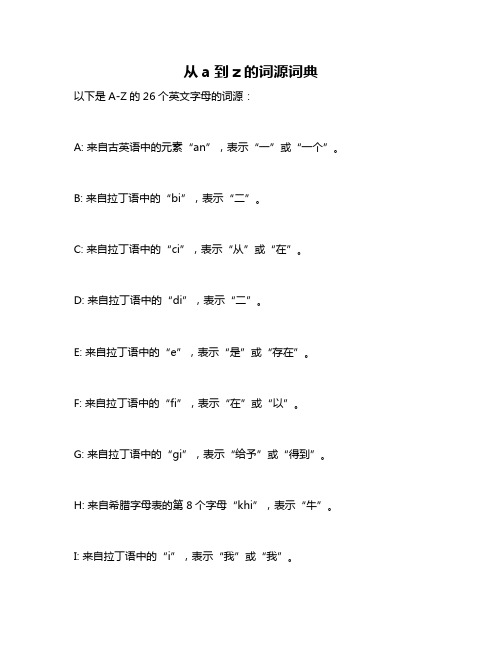
从a到z的词源词典以下是A-Z的26个英文字母的词源:A: 来自古英语中的元素“an”,表示“一”或“一个”。
B: 来自拉丁语中的“bi”,表示“二”。
C: 来自拉丁语中的“ci”,表示“从”或“在”。
D: 来自拉丁语中的“di”,表示“二”。
E: 来自拉丁语中的“e”,表示“是”或“存在”。
F: 来自拉丁语中的“fi”,表示“在”或“以”。
G: 来自拉丁语中的“gi”,表示“给予”或“得到”。
H: 来自希腊字母表的第8个字母“khi”,表示“牛”。
I: 来自拉丁语中的“i”,表示“我”或“我”。
J: 来自法语中的“j”,表示“和”或“与”。
K: 来自希腊字母表的第2个字母“khi”,表示“角”或“尖”。
L: 来自拉丁语中的“li”,表示“从”或“在”。
M: 来自拉丁语中的“mi”,表示“我”。
N: 来自拉丁语中的“ni”,表示“你”。
O: 来自拉丁语中的“o”,表示“一”或“一个”。
P: 来自拉丁语中的“pi”,表示“在”或“以”。
Q: 来自希腊字母表的第17个字母“khi”,表示“牛”。
R: 来自拉丁语中的“ri”,表示“二”或“两”。
S: 来自拉丁语中的“se”,表示“是”或“存在”。
T: 来自拉丁语中的“ti”,表示“在”或“以”。
U: 来自拉丁语中的“u”,表示“你”。
V: 来自拉丁语中的“vi”,表示“五”。
W: 来自中世纪的缩写,由两个V组成,表示两次或两个。
X: 来自希腊字母表的第24个字母,代表未知数。
Y: 来自希腊字母表的第25个字母,代表未知数。
Z: 来自希腊字母表的第26个字母,代表未知数。
英语单词词源分类词典

英语单词词源分类词典
一、人体相关(Body - related)
1. head [hed] (n.)
- 词源:古英语“hēafod”,其根源可追溯到日耳曼语族。
2. hand [hænd] (n.)
- 词源:古英语“hond”,同样源于日耳曼语族。
3. foot [fʊt] (n.,复数feet [fiːt])
- 词源:古英语“fōt”,日耳曼语族来源。
二、自然事物(Natural things)
1. sun [sʌn] (n.)
- 词源:古英语“sunnandæg”,与日耳曼语有关,最初表示“白天的天体”。
2. moon [muːn] (n.)
- 词源:古英语“mōna”,日耳曼语根源,与测量时间有关,因为月相可用于计时。
3. tree [triː] (n.)
- 词源:古英语“trēow”,日耳曼语族词源。
三、家庭相关(Family - related)
1. father ['fɑːðə(r)] (n.)
- 词源:古英语“fæder”,日耳曼语来源。
2. mother ['mʌðə(r)] (n.)
- 词源:古英语“mōdor”,日耳曼语根源。
3. child [tʃaɪld] (n.,复数children ['tʃɪldrən]) - 词源:古英语“cild”,日耳曼语族词源。
英语趣词源字典

英语趣词源字典在英语学习中,了解单词的词源是十分重要的一项知识。
通过了解单词的来源,我们可以更好地理解其含义和用法。
本文以《英语趣词源字典》为标题,将为大家介绍一些有趣的英语词汇及其来历。
一、Bamboozle(愚弄)这个词源于17世纪初期,当时在英格兰存在一种充满欺诈的赌博游戏,参与者常常被愚弄。
而后,人们将这种愚弄的感觉与竹子的弯曲形态联系在一起,形成了“bamboozle”这个词。
如今,我们用这个词来描述被别人欺骗或愚弄的情况。
二、Mimic(模仿)“Mimic”一词的由来可以追溯到古希腊神话中,那时有一只名叫“Mimicry”的麻雀,它能够模仿人类的语言。
由于这只鸟的特殊能力,人们就用“mimic”来形容模仿的行为。
现代英语中,我们常用这个词来指代模仿他人的动作或语言。
三、Pandemonium(喧嚣)这个词源于英国诗人米尔顿的史诗《失乐园》,在其中描述了地狱中一座怪异的宫殿,名为“Pandemonium”。
这个宫殿中有各种恶魔和邪恶生物,它们喧闹不堪,制造出一片混乱的景象。
因此,我们称混乱、喧嚣的场面为“pandemonium”。
四、Quarantine(隔离)这个词最早出现在14世纪意大利的威尼斯,当时这座城市面对来自东方的瘟疫。
为了避免疾病的传播,当地政府决定将来自受影响地区的人们隔离在一个名为“quaranta giorni”的地方,意为“四十天”。
随着时间的推移,人们开始将“quaranta giorni”简化成了“quarantine”,来表示隔离的意思。
五、Utopia(乌托邦)“Utopia”最早是由英国作家托马斯·莫尔创造的。
在他的作品《乌托邦》中,他描绘了一个理想化的社会,这个社会不存在贪婪、战争和不公平。
这个词的含义由此衍生出来,用来指代一个不存在的理想社会。
六、Nemesis(报应)在古希腊神话中,涅墨西斯(Nemesis)是复仇女神,她是惩罚犯罪者的代表。
现代英语词源字典使用方法
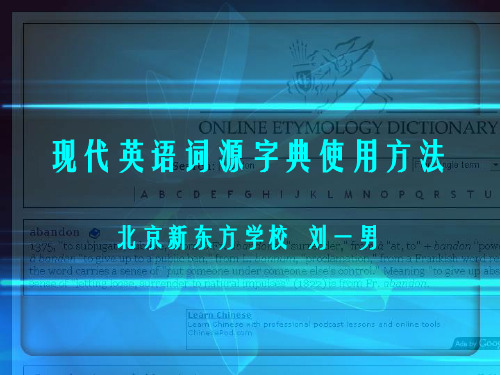
prudent
审慎的、 小心行事的、 谨慎的、
节俭的
词源…
真题… …
prud-”词根”-谨慎, ent-的 因为爱,所以爱… …
例句: be modest and prudent
谦虚谨慎
我们开始,会有很多选择…
“不如等他” ——怕不等他他生气 ——审慎的
p-不,rude-粗鲁的, ent-的——不粗鲁的 ——小心的
1,为什么在中国会出现新东方。 2,为什么中国人学英语(词汇)那么难。
1,为什么在中国会出现新东方。 2,为什么中国人学英语(词汇)那么难。
为什么有些单词很难记忆
lurk [lE:k]
n. 潜伏, 埋伏 vi. 潜藏, 潜伏
为什么有些单词很难记忆
lurk [lE:k]
n. 潜伏, 埋伏 vi. 潜藏, 潜伏
感性观察/理性解读
lower
lur k
潜伏
感性观察/理性解读
lower
lur k
潜伏
感性观察/理性解读
lower
lur
lwr
k
潜伏
l ur
l urk
example of Chinese
身残志坚
身贱志坚
残--贱
example of Chinese
身残志坚
身贱志坚
残--贱
example of Chinese
谢谢大家!
北京新东方学校 刘一男
《爱的代E:\湖南三地\湖南三地.mpg价》
现代英语词源字典使用方法
北京新东方学校 刘一男
1,为什么在中国会出现新东方。 2,为什么中国人学英语(词汇)那么难。
G-I-…-K-J-C-A
G
英语词源字典 Q
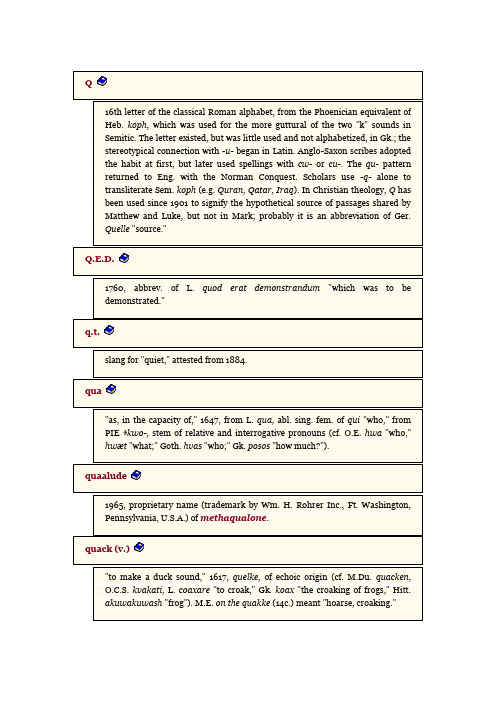
1707, "offspring of a white and a mulatto," from Sp.cuarteron(used chiefly of the offspring of a European and a mestizo), fromcuarto"fourth," from L.quartus(seequart), so called because he or she has one quarter African blood. Alt. by infl. of words inquadr-.
quadriplegic (adj.)
1921, a medical hybrid coined from L. prefixquadri-"four" +-plegic,as inparaplegic,ult. from Gk.plege"stroke," from root ofplessein"to strike." A correct, all-Gk. form would be*tessaraplegic.The noun is first attested 1958, from the adj.
quadrant
1398, "a quarter of a day, six hours," from L.quadrantem(nom.quadrans) "fourth part," prop. prp. ofquadrare"to make square," fromquadrus"a square," fromquattuor"four" (seequart). Sense of "measuring instrument" is first recorded c.1400, so called because it forms a quarter cinquaffer), perhaps onomatopoeic, or perhaps from Low Ger.quassen"to overindulge (in food and drink)," with-ss-misread as-ff-.The noun is from 1579.
英语词源表
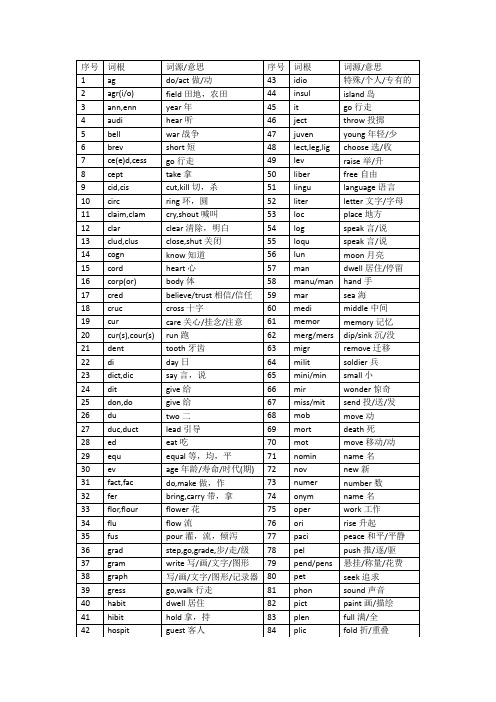
11
N
生/船
否定
不好的东西
知道kn
12
P
平面/手掌
相似手掌
说
表现
13
Q
Qu取得
14
R
小草
直立升起
跑/路
旋转/重复
15
S
出气
吸气
坐下
16
T
向前去
向上去
turn
17
V
胜利/切分
行走/旋转
观看
生命/水
18
W
水
行走(V)
看
女性
19
X
20
Y
21
Z
Words
Prefix
249
ver(i)
真实
208
past
喂/食
250
voc/vok
声音/叫喊
209
path(o)/pathy
疾病/疗法
251
vol/volunt
意志/意愿
210
patr(i)
父/祖
252
volu/volv
滚/转
序号
词根
词源/意思
序号
词根
词源/意思
1
sist=st
Stand站
9
di=bi=du
two
2
nim=nym=nom
Name
10
patr
pater爸爸
3
tri
Three
11
sim=sym=sem
same
4
serve
Save保留
12
dem
de+man人民
5
riv
现代英语词源字典使用方法刘一男
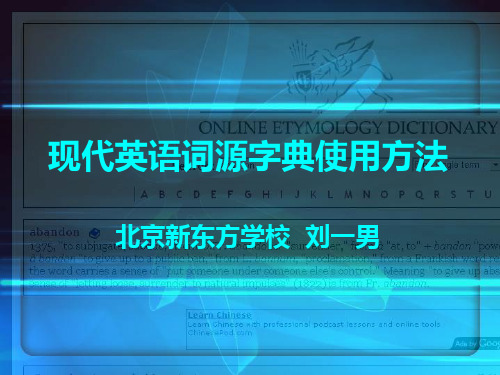
b-p-m-f(v)
t–d-s-g
bole [bEul] n. 树干, 树身 bone [bEun] n. 骨,骨头 man
[mAn] n. 男人, 人类, 人
male
[meil] adj. 男的, 雄的
r-l-n-m
u-v-w
辅音字母语音变化密码
u
v
w
辅音渠道
prudent
[5pru:dEnt]
为什么有些单词很难记忆
lurk = ? ? 潜伏
为什么有些单词很难记忆
为什么有些单词很难记忆
fantasy
[5fAntEsi] n.幻想,白日梦
为什么有些单词很难记忆
为什么有些单词很难记忆
为什么有些单词很难记忆
新东方词汇课堂的竞争对手
老俞红宝
星火词汇
New Oriental Teacher
apt-适合、容易的 appropriate-适合的 appropriate-适合的 appropriate = ap+proper+ate proper-适合的、恰当的
简化=简单?
adept
[e5dept]
adj. 熟练的, 拿手的 n. 老手, 擅长者
ad-加强语气,
ept-压缩自“expert-专家”
现代英语词源字典使用方法
北京新东方学校 刘一男
1,为什么在中国会出现新东方。 2,为什么中国人学英语(词汇)那么难。
G-I-…-K-J-C-A
G
A
K J I C
2007全球雅思考试平均分
1,为什么在中国会出现新东方。 2,为什么中国人学英语(词汇)那么难。
1,为什么在中国会出现新东方。 2,为什么中国人学英语(词汇)那么难。
钱伯斯英语词源字典
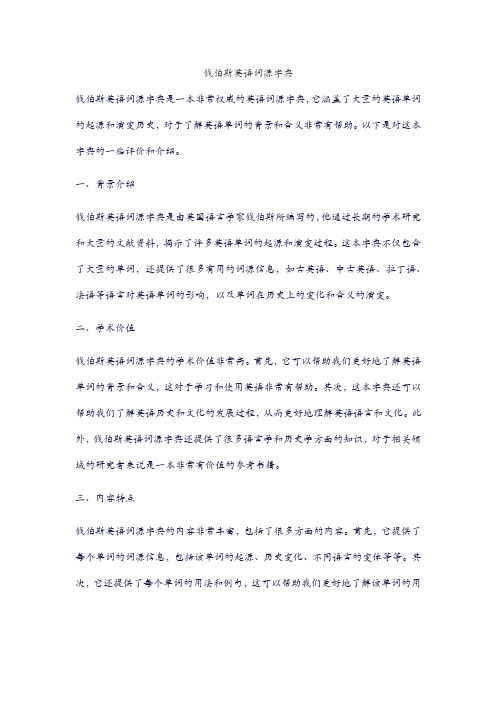
钱伯斯英语词源字典钱伯斯英语词源字典是一本非常权威的英语词源字典,它涵盖了大量的英语单词的起源和演变历史,对于了解英语单词的背景和含义非常有帮助。
以下是对这本字典的一些评价和介绍。
一、背景介绍钱伯斯英语词源字典是由英国语言学家钱伯斯所编写的,他通过长期的学术研究和大量的文献资料,揭示了许多英语单词的起源和演变过程。
这本字典不仅包含了大量的单词,还提供了很多有用的词源信息,如古英语、中古英语、拉丁语、法语等语言对英语单词的影响,以及单词在历史上的变化和含义的演变。
二、学术价值钱伯斯英语词源字典的学术价值非常高。
首先,它可以帮助我们更好地了解英语单词的背景和含义,这对于学习和使用英语非常有帮助。
其次,这本字典还可以帮助我们了解英语历史和文化的发展过程,从而更好地理解英语语言和文化。
此外,钱伯斯英语词源字典还提供了很多语言学和历史学方面的知识,对于相关领域的研究者来说是一本非常有价值的参考书籍。
三、内容特点钱伯斯英语词源字典的内容非常丰富,包括了很多方面的内容。
首先,它提供了每个单词的词源信息,包括该单词的起源、历史变化、不同语言的变体等等。
其次,它还提供了每个单词的用法和例句,这可以帮助我们更好地了解该单词的用法和语境。
此外,钱伯斯英语词源字典还按照字母顺序排列了所有单词,方便读者查找和使用。
四、使用体验使用钱伯斯英语词源字典是一种非常愉悦的体验。
首先,它的内容非常丰富和权威,可以帮助我们解决很多词汇方面的问题。
其次,它还提供了很多有用的词源信息,这可以帮助我们更好地了解英语单词的背景和含义。
此外,钱伯斯英语词源字典的设计也非常精美,字体清晰、排版整齐,非常适合长时间阅读。
五、比较其他工具书与其他词源字典相比,钱伯斯英语词源字典更加全面和权威。
例如,它不仅提供了每个单词的起源和演变历史,还提供了该单词在不同语言中的变体和用法。
这使得读者可以更加全面地了解每个单词的历史和用法。
此外,钱伯斯英语词源字典还提供了很多有用的词源信息和其他语言学知识,这使得读者可以更加深入地了解英语语言和文化。
英语词源

1、Chemistry 化学古代的炼金术士们总想找到一种方法,将低贱的金属变为金子。
现在通过原子裂变的原理表明,他们的这种想法并非一般人们想象的那么愚蠢。
古埃及人入侵欧洲后,将他们所研究的炼金术,连同其命名al-kimia一起传入欧洲。
后来,这个词变成alchemy,“炼金的人”叫做alchemis t,最后成了chemistry,“化学”的概念就是从“炼金术”演变来的。
2、Geology 地质学“地质学”是研究形成地球的物质和地壳构造,以探讨地球的形成和发展的科学。
Geology是从希腊语来的,ge即“earth”;-ology,“science”,即研究地球本身的科学。
3、Law 法律“法律”是立法机关制定的、国家政权保证执行的行为规则。
Law在古英语中写作lagu,意即“s om ething laid down(规定下来的事情)”。
4、Electricity 电古希腊人常用琥珀制作爱情护符,确信戴着这种护符的人可以引来爱人。
他们发现,磨擦琥珀可以吸引羽毛、线头等小东西,磨擦时会放出火花。
他们就把这种磨擦起电的现象叫做elektron.来自希腊语elektor,意即“发光的太阳”,进入拉丁语后写作electrum.英语演变为electricit y。
5、Atom 原子古希腊人认为,特质是不可能无限止地分割下去的,越分越小,最后小到不可再分。
他们把“原子”叫做atomos:a即“not”;tomos ,“cut”意即“不能再分割”以后这个词在英语中演变为a tom.尽管后来发现“原子”并非“不可再分割”,然而约定俗成,“原子”的名字仍然以atom流传下来。
6、Uranium 铀“铀”是一种放射性金属元素,化学符号为U,主要用来产生原子能。
著名的物理学家居里夫人曾用铀作实验,发现了放射现象。
Uranium这个词是从希腊神话中一位神的名字来的。
1781年,英籍德国天文学家赫瑟尔(Si r William Herschel)发现了颗尚未被人们发现的行星,于是他就借用了希腊神话中“天王”Ou ranos的名字,命名这颗行星为Uranus.即“天王星”。
英语词源学词典
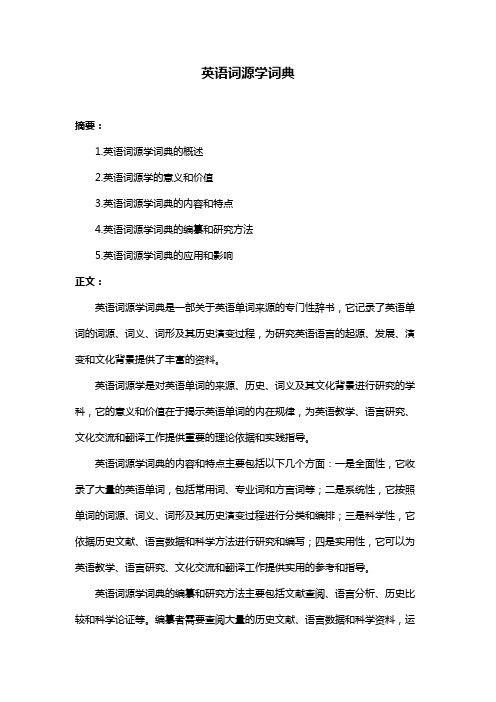
英语词源学词典
摘要:
1.英语词源学词典的概述
2.英语词源学的意义和价值
3.英语词源学词典的内容和特点
4.英语词源学词典的编纂和研究方法
5.英语词源学词典的应用和影响
正文:
英语词源学词典是一部关于英语单词来源的专门性辞书,它记录了英语单词的词源、词义、词形及其历史演变过程,为研究英语语言的起源、发展、演变和文化背景提供了丰富的资料。
英语词源学是对英语单词的来源、历史、词义及其文化背景进行研究的学科,它的意义和价值在于揭示英语单词的内在规律,为英语教学、语言研究、文化交流和翻译工作提供重要的理论依据和实践指导。
英语词源学词典的内容和特点主要包括以下几个方面:一是全面性,它收录了大量的英语单词,包括常用词、专业词和方言词等;二是系统性,它按照单词的词源、词义、词形及其历史演变过程进行分类和编排;三是科学性,它依据历史文献、语言数据和科学方法进行研究和编写;四是实用性,它可以为英语教学、语言研究、文化交流和翻译工作提供实用的参考和指导。
英语词源学词典的编纂和研究方法主要包括文献查阅、语言分析、历史比较和科学论证等。
编纂者需要查阅大量的历史文献、语言数据和科学资料,运
用语言学、历史学和科学方法进行分析、比较和论证,以确保词典的科学性和可靠性。
英语词源词根词典
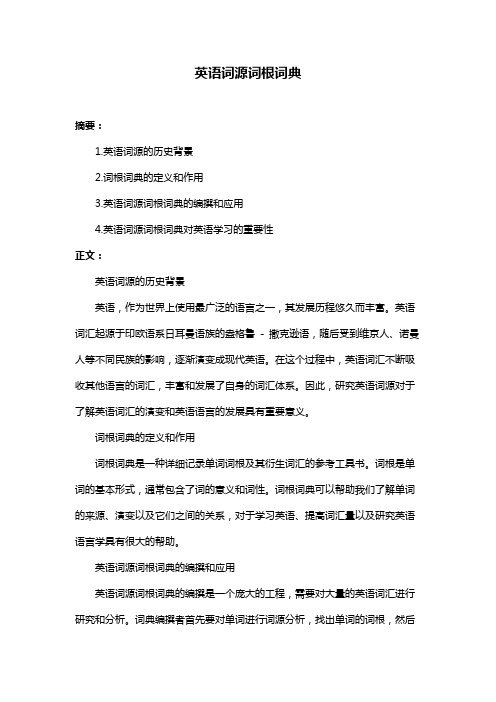
英语词源词根词典摘要:1.英语词源的历史背景2.词根词典的定义和作用3.英语词源词根词典的编撰和应用4.英语词源词根词典对英语学习的重要性正文:英语词源的历史背景英语,作为世界上使用最广泛的语言之一,其发展历程悠久而丰富。
英语词汇起源于印欧语系日耳曼语族的盎格鲁- 撒克逊语,随后受到维京人、诺曼人等不同民族的影响,逐渐演变成现代英语。
在这个过程中,英语词汇不断吸收其他语言的词汇,丰富和发展了自身的词汇体系。
因此,研究英语词源对于了解英语词汇的演变和英语语言的发展具有重要意义。
词根词典的定义和作用词根词典是一种详细记录单词词根及其衍生词汇的参考工具书。
词根是单词的基本形式,通常包含了词的意义和词性。
词根词典可以帮助我们了解单词的来源、演变以及它们之间的关系,对于学习英语、提高词汇量以及研究英语语言学具有很大的帮助。
英语词源词根词典的编撰和应用英语词源词根词典的编撰是一个庞大的工程,需要对大量的英语词汇进行研究和分析。
词典编撰者首先要对单词进行词源分析,找出单词的词根,然后整理成词典供人们查阅。
英语词源词根词典可以帮助英语学习者更好地理解和记忆单词,提高词汇量和阅读能力。
此外,词源词典还可以为语言学家、历史学家和文化研究者提供有价值的信息,帮助他们探究英语语言的发展和演变。
英语词源词根词典对英语学习的重要性英语词源词根词典对英语学习具有重要意义。
首先,通过学习词源,我们可以更好地理解和记忆单词。
词源词典可以帮助我们了解单词的意义、词性和来源,使我们能够更加系统地学习和记忆单词。
其次,词源词典可以扩大我们的词汇量。
通过查阅词源词典,我们可以了解到许多衍生词汇,从而丰富我们的词汇体系。
最后,词源词典有助于提高我们的阅读能力。
在阅读过程中,遇到生词时,我们可以通过词源词典来分析其词根和词义,从而更好地理解文章。
综上所述,英语词源词根词典对于英语学习者和语言研究者都具有重要的参考价值。
英语单词词源
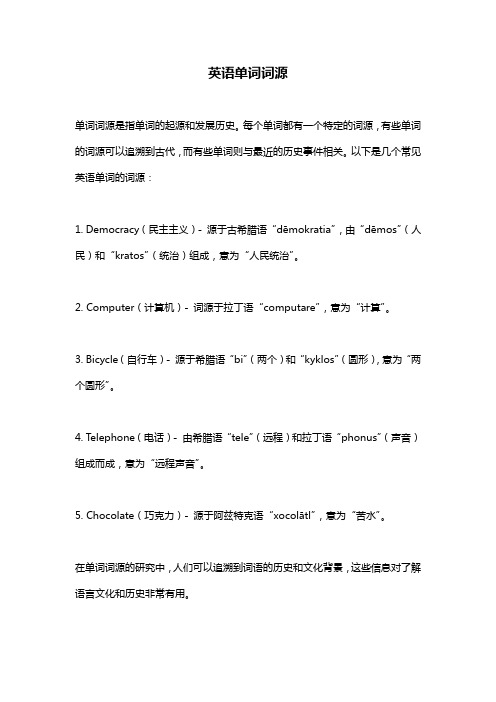
英语单词词源
单词词源是指单词的起源和发展历史。
每个单词都有一个特定的词源,有些单词的词源可以追溯到古代,而有些单词则与最近的历史事件相关。
以下是几个常见英语单词的词源:
1. Democracy(民主主义)- 源于古希腊语“dēmokratia”,由“dēmos”(人民)和“kratos”(统治)组成,意为“人民统治”。
2. Computer(计算机)- 词源于拉丁语“computare”,意为“计算”。
3. Bicycle(自行车)- 源于希腊语“bi”(两个)和“kyklos”(圆形),意为“两个圆形”。
4. Telephone(电话)- 由希腊语“tele”(远程)和拉丁语“phonus”(声音)组成而成,意为“远程声音”。
5. Chocolate(巧克力)- 源于阿兹特克语“xocolātl”,意为“苦水”。
在单词词源的研究中,人们可以追溯到词语的历史和文化背景,这些信息对了解语言文化和历史非常有用。
英语词源漫谈中dictionary
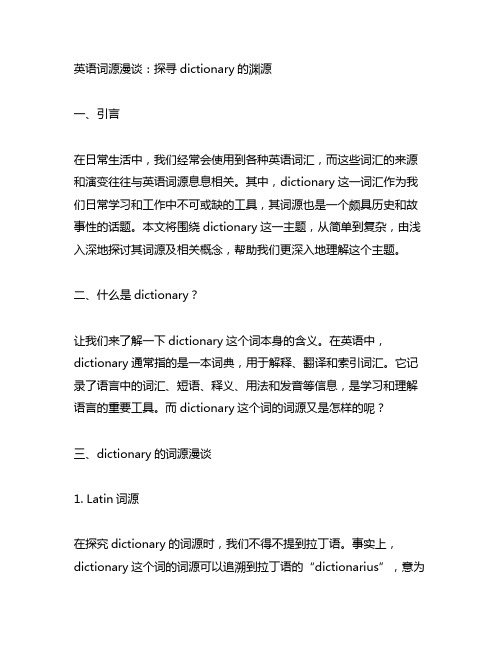
英语词源漫谈:探寻dictionary的渊源一、引言在日常生活中,我们经常会使用到各种英语词汇,而这些词汇的来源和演变往往与英语词源息息相关。
其中,dictionary这一词汇作为我们日常学习和工作中不可或缺的工具,其词源也是一个颇具历史和故事性的话题。
本文将围绕dictionary这一主题,从简单到复杂,由浅入深地探讨其词源及相关概念,帮助我们更深入地理解这个主题。
二、什么是dictionary?让我们来了解一下dictionary这个词本身的含义。
在英语中,dictionary通常指的是一本词典,用于解释、翻译和索引词汇。
它记录了语言中的词汇、短语、释义、用法和发音等信息,是学习和理解语言的重要工具。
而dictionary这个词的词源又是怎样的呢?三、dictionary的词源漫谈1. Latin词源在探究dictionary的词源时,我们不得不提到拉丁语。
事实上,dictionary这个词的词源可以追溯到拉丁语的“dictionarius”,意为“字典”或“词典”。
这个词源展现了古罗马人对于语言和文字记录的重视,同时也反映了古代文明中对于知识和学问的珍视。
2. 中世纪演变随着时间的推移,dictionary这一词汇在中世纪逐渐演变成了中世纪拉丁语中的“dictionarium”或“dictionarius”。
在中世纪,这些词典开始被用于宗教、学术和文学领域,成为当时知识传承和交流的重要工具。
3. 英语语境随着时代的变迁,dictionary这一词汇进入了英语语境,并逐渐成为今天我们所使用的形式,“dictionary”。
在英语中,这个词汇不仅仅指代传统的词典,还包括了各种形式的语言工具,如电子词典、在线词典等。
它的词源经历了千年,但仍保留着对知识和语言的珍视和传承。
四、总结与回顾通过对dictionary这一词汇词源的解析,我们不仅仅了解了它的历史渊源,还能感受到人类对于知识和语言的不懈探索和传承。
[整理版]词源字典缩写查询表
![[整理版]词源字典缩写查询表](https://img.taocdn.com/s3/m/4447824a03768e9951e79b89680203d8ce2f6ad5.png)
[整理版]词源字典缩写查询表词源字典缩写查询表语言类缩写查询表缩写全称解释 Amer.Eng. American English 美式英语 Anglo-Fr. Anglo-French 诺曼时代在英国所用的法语Anglo-L. nglo-Latin 中世纪在英国所用的拉丁文Anglo-Norm. Anglo-Norman 盎格鲁诺曼语 Ar. Arabic 阿拉伯语 Arm. Armenian 亚美尼亚语 Celt. Celtic 凯尔特语 Du. Dutch 荷兰语 E.Fris. East Frisian 东弗里斯兰语 Egypt. Egyptian 埃及语 Eng. English 英语 Fl. Flemish 佛兰德斯语 Fr. French 法语 Frank. Frankish 法兰克语,法兰克人讲的(西)人耳曼语Fris. Frisian 弗里斯兰语 Gael. Gaelic 盖尔语Gaul. Gaulish 高卢语Ger. German 德语Goth. Gothic 哥特语Gk. Greek 希腊语Gmc. Germanic 日耳曼语Heb. Classical Hebrew 经典希伯来语Hung. Hungarian 匈牙利语I.E. Indo-European 印欧语Ir. Irish 爱尔兰语Iran. Iranian 伊朗语It. Italian 意大利语L. Classical Latin 经典拉丁语Lith. Lithuanian 立陶宛语L.L. Late Latin 后期拉丁语,晚期拉丁语Low Ger. Low German 低地德语(德意志北部和西部使用的德语) M.Du.Middle Dutch 中古荷兰语M.E. Middle English 中古英语M.Fr. Middle French 中古法语M.H.G. Middle High German 中古高地德语M.Ir. Middle Irish 中古爱尔兰语 M.L. Medieval Latin 中古拉丁文 M.L.G. Middle Low German 中古低地德语 Mod.Eng. Modern English 近代英语 Mod.Gk. Modern Greek 近代希腊语 Mod.L. Modern Latin 近代拉丁语 N.Gmc. North Germanic 北日耳曼语 Norm. Norman 诺曼语O.Celt. Old Celtic 古凯尔特语 O.C.S. Old Church Slavonic 古教会斯拉夫语 O.Dan. Old Danish 古丹麦语 O.Du. Old Dutch 古荷兰语 O.E. OldEnglish 古英语 O.Fr. Old French 古法语 O.Fris. Old Frisian 古弗里斯兰语O.H.G. Old High German 古高地德语 O.Ir. Old Irish 古爱尔兰语 O.It. Old Italian 古意大利语 O.LowG. Old Low German 古低地德语 O.N. Old Norse 古挪威语 O.N.Fr. Old North French 古法国北部方言 O.Pers. Old Persian 古波斯语O.Prov. Old Provençal 古普罗旺斯语 O.Prus. Old Prussian 古普鲁士语言O.S. Old Saxon 古撒克逊语 Osc. Oscan 欧斯坎语言O.Slav. Old Slavic 古斯拉夫语 O.Sp. Old Spanish 古西班牙语 O.Swed.Old Swedish 古瑞典语 Pers. Persian 波斯语P.Gmc. Proto-Germanic 原始日耳曼语 Phoen. Phoenician 腓尼基语 PIE Proto-Indo-European 原始印欧语 Pol. Polish 波兰语Port. Portuguese 葡萄牙语Prov. Provençal 普罗旺斯语 Russ. Russian俄语Scand. Scandinavian 斯堪的纳维亚语 Scot. Scottish 苏格兰语S.Cr. Serbo-Croatian 塞尔维亚-克罗地亚语 Sem. Semitic 闪语,闪米特语Serb. Serbian 塞尔维亚语Skt. Sanskrit 梵语Slav. Slavic 斯拉夫语Sp. Spanish 西班牙语Swed. Swedish 瑞典语 Turk. Turkish 土耳其语 V.L. Vulgar Latin 通俗拉丁语 W.Afr. West African 西非语 W.Fris. West Frisian 西弗里斯兰语 W.Gmc. West Germanic 西日耳曼语 W.Saxon West Saxon 西撒克逊语其中,对英语词汇影响较大的语言出现的频率较高,这些语言有:Fr. French 法语Gk. Greek 希腊语L. Classical Latin 经典拉丁语 L.L. Late Latin 后期拉丁语,晚期拉丁语M.E. Middle English 中古英语 M.Fr. Middle French 中古法语 M.L. Medieval Latin 中古拉丁文 O.E. Old English 古英语 O.Fr. Old French 古法语语法与常识类缩写查询表缩写全称翻译abl. Ablative 离歌/夺格 acc. Accusative 宾格adv. Adverb 副词alt. Alternativec. Century 世纪caus. Causative 使役动词 cf. confer 参见chem. Chemical 化学 comb. Combining 结合 comp. Comparative 比较级dat. Dative 与格deriv. Derived 源自dim. Diminutive 指小词 e.g. exempli gratia 例如 esp. Especially 尤其是 etc. et cetera 等等fem. Feminine 阴性freq. Frequentative 反复(动词) fut. Future 将来时态 gen. Genitive 属格 ger. Gerund 动名词 imper. Imperative 命令式 indic. Indicative 陈述式inf. Infinitive 不定式 infl. Influenced 影响 instrumental instrumental 工具格 intens. Intensive 加强词义 intrans. Intransitive 不及物 irreg. Irregular 不规则 lit. Literally 字面意思为 loc. Locative 位格 masc. Masculine 阳性 n. Noun 名词neut. Neuter 中性 nom. Nominative 主格 N.T. New Testament 新约 obj. Objective 宾语 obs. Obsolete 已过时的 optative optative 希求式 orig. Originally 源自 part. Participle 分词 pass. Passive 被动态 perf. Perfective 完成时态 pers. Person 人称pl. Plural 复数poss. Possessive 所有格 pp. Past participle 过去分词/完成分词prep. Preposition 介词 pres. Present tense 现在时 pres.-pret. Present-preterite 现在过去时pret. Preterite 一般过去时 priv. Privative 否定词缀 prob. Probably 可能 pron. Pronoun 代词 prop. Properly 准确的说 prp. Present participle 现在分词 pt. Past tense 过去时 q.v. quo vide 参见 redupl. Reduplicated 复写的 refl. Reflexive 自反动词 rhotacism rhotacism r音化root root 词根sing. Singular 单数 subj. Subject 主语 subjunctive subjunctive 虚拟式 superl. superlative 最高级 transl. translation 翻译 trans. Transitive 及物动词 ult. Ultimately 最终 uncert. Uncertain 尚不确定 v. Verb 动词var. Variant 派生。
【探究—英语词源字典】
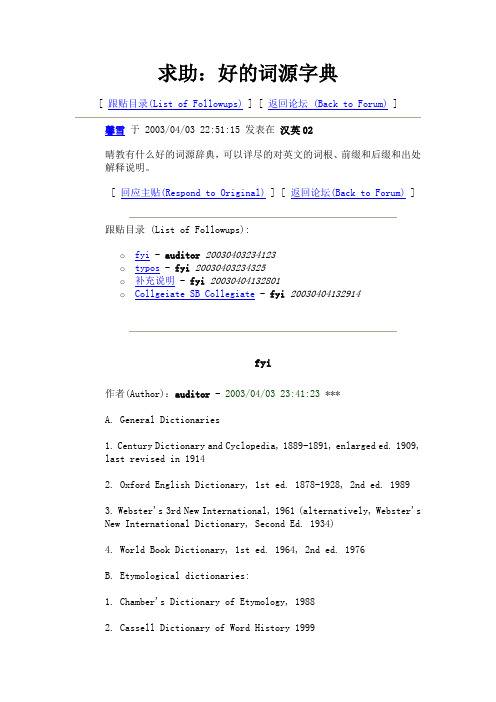
求助:好的词源字典[ 跟贴目录(List of Followups) ] [ 返回论坛 (Back to Forum) ]馨雪于 2003/04/03 22:51:15 发表在汉英02晴教有什么好的词源辞典,可以详尽的对英文的词根、前缀和后缀和出处解释说明。
[ 回应主贴(Respond to Original) ] [ 返回论坛(Back to Forum) ] 跟贴目录 (List of Followups):o fyi - auditor20030403234123o typos - fyi20030403234325o补充说明 - fyi20030404132801o Collgeiate SB Collegiate - fyi20030404132914fyi作者(Author):auditor - 2003/04/03 23:41:23 ***A. General Dictionaries1. Century Dictionary and Cyclopedia, 1889-1891, enlarged ed. 1909, last revised in 19142. Oxford English Dictionary, 1st ed. 1878-1928, 2nd ed. 19893. Webster's 3rd New International, 1961 (alternatively, Webster's New International Dictionary, Second Ed. 1934)4. World Book Dictionary, 1st ed. 1964, 2nd ed. 1976B. Etymological dictionaries:1. Chamber's Dictionary of Etymology, 19882. Cassell Dictionary of Word History 19993. Origins, A short etymological dictionary of modern English4. A Comprehensive Dictionary of The English Language (2 vol. set)5. The American Heritage Dictionary of Indo-European Roots, 1st ed. 1985, 2nd ed. 2000, more accessibly in the form of the appendix to "American Heritage Dictionary" 1st. ed. 1966, 2nd. ed. 1988, 3rd. ed. 1993, 4th ed. 2000.C. Begninner's Textbook:1. "The Origins of English Words", a discursive dictionary of Indo-European Roots, by Joseph T. Shipley, 1984.ISBN: 0-8018-3004-4, personal obsersations: Mr. Shipley does NOT understand Classic Greek at all, nor does he care to look them up in ANY authoratative bilingual Greek dictionary, period. As a result, many glaring/flagrant errors about Classic Greek permeated throughout his most celebrated works. Nevertheless, Mr. Shipley showed his diligence in using and familarity with OED (1st ed.)--he probably had spent over 10,000 working hours pouring over OED1 in more than 2 decades.[ 回应此贴(Respond to this followup) | 查看原贴(Back to Original) ]typos作者(Author):fyi - 2003/04/03 23:43:25 ***2nd. ed. 1988, SB "2nd ed. 1982"C. Begninner's Textbook: SB "Beginner's Textbook"[ 回应此贴(Respond to this followup) | 查看原贴(Back to Original) ]补充说明作者(Author):fyi - 2003/04/04 13:28:01 ***A. General Dictionaries中小型词典:中型词典:Webster's New World Dictionary, 1st Ed. 1953, 2nd Ed. 1970, 3rd ed. 1988, 4th ed. 2000 在词源方面颇多可取.Random House系列则优点不突出.小型词典: Macmillan Dictionary for Students 虽然只提供了大约18,000词的词源, 但是写得深入浅出, addle ("风蛋" 如何变成了"臭蛋") 等词源介绍显得丝毫不比大中型语文词典逊色. Scott, Foresman Advanced Dictionary 风格接近, 可以视为World Book Dictionary简写本.B. Etymological dictionaries:由于疏忽, Oxford Dictionary of English Etymology (简称DEE)被遗漏, 收录24,000 entriesSkeat: An Etymological dictionary of the English Language, 1910 (somewhat dated)Weekley: Etymological dictionary of Modern English--just another name, 不如 Patridge's "Origin" user-friendly.1. Chamber's Dictionary of Etymology, 1988 VERY EXCELLENT (如果你是语言专家的专家, 你可能认为该书有点浅)2. Cassell Dictionary of Word History 1999, 简明实用, 但不搞旁征博引.3. Origins, A short etymological dictionary of modern English. One of my personal favorites.4. A Comprehensive Dictionary of The English Language (1966, 2 vol. set) 作者有以色列/捷克血统, 少年时代移民加拿大, 对英语词源尤其感兴趣, 花数十年时间编成此书, 在多伦多出版, 为加拿大自己出版的英语词源辞书中最大规模, 但是此书并不是特别为专门学习词源的学生考虑的, 仅为一般翻检适用. 作者Ernest Klein对英语词源钻研至深, 可视为"日耳曼"人以外屈指可数的少数人之一.C. Begninner's Textbook:2. Morris dictionary of word and phrase origins.以及许多同类/相关书籍, 程度不一, 包括韦氏公司自己出的通俗性读物.============================================================词源介绍范围:1. Unabridged dictionaries: 80,000 以上, OED, Century, W3/2均已达到120,000-160,000个词源, Hunter's Dictionary (1878 -1906 various ed.) 80,000 -100,000 个2. RHUD: 大约75,000个3. Collgeiate类: 38,000 - 55,000 个左右.4. 小型/student Dictionary: 18,000-25,000 个左右.5. 专门的Etymological dictionaries: 20,000 -45,000个左右. The American Heritage Dictionary of Indo-European Roots 单行本只有15,000个词左右, 但是是fully indexed, 便于系统学习.如果你看懂了以上书籍, 还有1. Roland Wilbur Brown所写的 COMPOSITION OF SCIENTIFIC WORDS A Manual of Methods and a Lexicon of Materials for the Practice of Logotechnics.吃透了Brown, 你的英语词汇量将在100,000以上, 如果能够灵活运用, 举一反二/三, 则能达到250,000以上.Life after Brown:还有德国人的"印欧语族"词源词典的专著和论文等着你的挑战, 目前仍然以Pokorny: Indogermanishes etymologisches Wörterbuch (1953) 为顶峰之作. 如果你能发现该书的不足之处, 写成论文, 便可自成一家.The amount of estimated time from GROUND 0 to Brown/Pokorny needed: ≥ 10 years.[ 回应此贴(Respond to this followup) | 查看原贴(Back to Original) ]Collgeiate SB Collegiate作者(Author):fyi - 2003/04/04 13:29:14 ***[ 回应此贴(Respond to this followup) | 查看原贴(Back toOriginal) ]【2】词源词典(etymological dictionary)。
英文词源词典
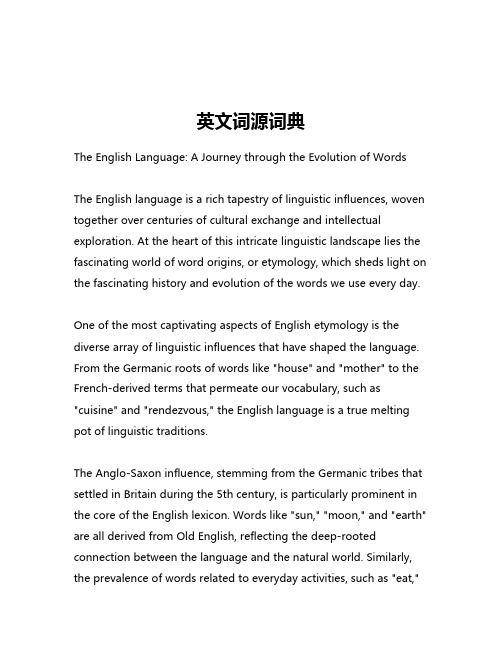
英文词源词典The English Language: A Journey through the Evolution of WordsThe English language is a rich tapestry of linguistic influences, woven together over centuries of cultural exchange and intellectual exploration. At the heart of this intricate linguistic landscape lies the fascinating world of word origins, or etymology, which sheds light on the fascinating history and evolution of the words we use every day.One of the most captivating aspects of English etymology is the diverse array of linguistic influences that have shaped the language. From the Germanic roots of words like "house" and "mother" to the French-derived terms that permeate our vocabulary, such as "cuisine" and "rendezvous," the English language is a true melting pot of linguistic traditions.The Anglo-Saxon influence, stemming from the Germanic tribes that settled in Britain during the 5th century, is particularly prominent in the core of the English lexicon. Words like "sun," "moon," and "earth" are all derived from Old English, reflecting the deep-rooted connection between the language and the natural world. Similarly, the prevalence of words related to everyday activities, such as "eat,""sleep," and "work," underscores the practical and pragmatic nature of the Anglo-Saxon linguistic legacy.The Norman Conquest of 1066, however, marked a significant turning point in the evolution of the English language. With the influx of French vocabulary, the language underwent a profound transformation, incorporating a wealth of new words related to government, law, and the arts. Terms like "justice," "parliament," and "art" all have their origins in the French language, reflecting the cultural and political influence of the Norman invaders.As the centuries passed, the English language continued to absorb and adapt words from a multitude of other linguistic sources. The influence of Latin, for instance, can be seen in scientific and academic terminology, such as "biology," "psychology," and "curriculum." The arrival of the Renaissance in Europe brought with it a surge of Greek-derived words, enriching the English vocabulary with terms like "philosophy," "mathematics," and "democracy."The global expansion of the British Empire during the 17th, 18th, and 19th centuries further diversified the English language, as words from far-flung corners of the world were incorporated into the lexicon. The influence of languages like Hindi, Arabic, and Mandarin Chinese can be seen in words such as "shampoo," "algebra," and "tea," reflecting the cultural exchange and trade that occurred duringthis period of history.In the modern era, the English language has continued to evolve, absorbing new words and adapting to the changing needs of a globalized world. The rise of technology, for instance, has led to the incorporation of terms like "internet," "software," and "emoji," which have become an integral part of our daily vocabulary.The study of English etymology not only illuminates the rich history of the language but also offers insights into the cultural, social, and political forces that have shaped its development over time. By tracing the origins of words, we can gain a deeper understanding of the way in which language reflects the human experience, capturing the nuances of thought, emotion, and cultural exchange.Moreover, the study of word origins can be a valuable tool in language learning and acquisition. By understanding the roots and derivations of words, students can more effectively navigate the complexities of the English language, developing a richer vocabulary and a deeper appreciation for the linguistic diversity that characterizes the global community.In conclusion, the English language is a testament to the power of linguistic exchange and the enduring human desire to communicate and connect. Through the lens of etymology, we can explore the richtapestry of words that have come to define our linguistic landscape, and in doing so, gain a deeper understanding of the cultural, historical, and intellectual forces that have shaped the language we use every day.。
英语词源
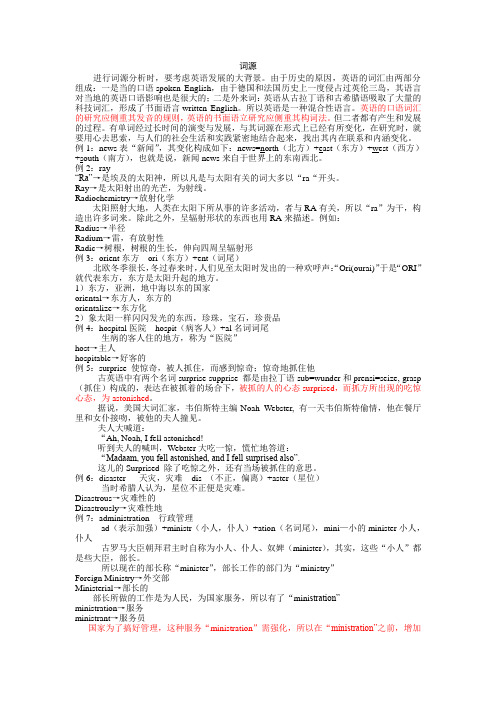
词源进行词源分析时,要考虑英语发展的大背景。
由于历史的原因,英语的词汇由两部分组成:一是当的口语spoken English,由于德国和法国历史上一度侵占过英伦三岛,其语言对当地的英语口语影响也是很大的;二是外来词:英语从古拉丁语和古希腊语吸取了大量的科技词汇,形成了书面语言written English。
所以英语是一种混合性语言。
英语的口语词汇的研究应侧重其发音的规则,英语的书面语立研究应侧重其构词法。
但二者都有产生和发展的过程。
有单词经过长时间的演变与发展,与其词源在形式上已经有所变化,在研究时,就要用心去思索,与人们的社会生活和实践紧密地结合起来,找出其内在联系和内涵变化。
例1:news表“新闻”,其变化构成如下:news=north(北方)+east(东方)+west(西方)+south(南方),也就是说,新闻news来自于世界上的东南西北。
例2:ray“Ra”→是埃及的太阳神,所以凡是与太阳有关的词大多以“ra“开头。
Ray→是太阳射出的光芒,为射线。
Radiochemistry→放射化学太阳照射大地,人类在太阳下所从事的许多活动,者与RA有关,所以“ra”为干,构造出许多词来。
除此之外,呈辐射形状的东西也用RA来描述。
例如:Radius→半径Radium→雷,有放射性Radic→树根,树根的生长,伸向四周呈辐射形例3:orient东方ori(东方)+ent(词尾)北欧冬季很长,冬过春来时,人们见至太阳时发出的一种欢呼声:“Ori(ourai)”于是“ORI”就代表东方,东方是太阳升起的地方。
1)东方,亚洲,地中海以东的国家oriental→东方人,东方的orientalize→东方化2)象太阳一样闪闪发光的东西,珍珠,宝石,珍贵品例4:hospital医院hospit(病客人)+al名词词尾生病的客人住的地方,称为“医院”host→主人hospitable→好客的例5:surprise 使惊奇,被人抓住,而感到惊奇;惊奇地抓住他古英语中有两个名词surprise supprise 都是由拉丁语sub=wunder和prensi=seize, grasp (抓住)构成的,表达在被抓着的场合下,被抓的人的心态surprised,而抓方所出现的吃惊心态,为astonished。
单词词源解释
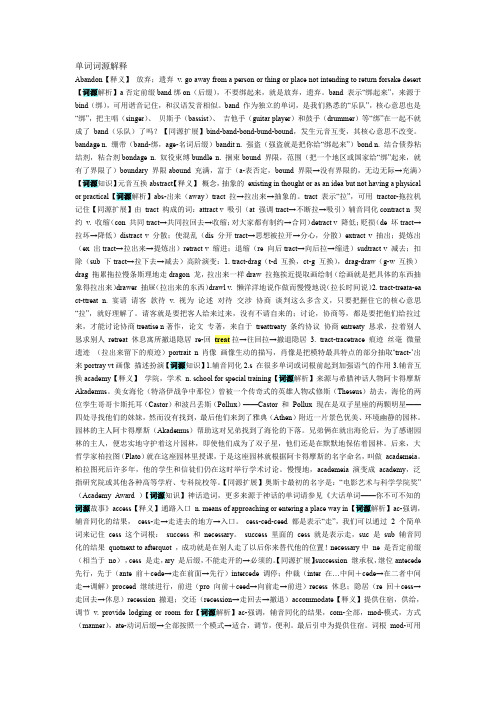
单词词源解释Abandon【释义】放弃;遗弃v. go away from a person or thing or place not intending to return forsake desert 【词源解析】a否定前缀band绑on(后缀),不要绑起来,就是放弃,遗弃。
band 表示“绑起来”,来源于bind(绑),可用谐音记住,和汉语发音相似。
band 作为独立的单词,是我们熟悉的“乐队”,核心意思也是“绑”,把主唱(singer)、贝斯手(bassist)、吉他手(guitar player)和鼓手(drummer)等“绑”在一起不就成了band(乐队)了吗?【同源扩展】bind-band-bond-bund-bound,发生元音互变,其核心意思不改变。
bandage n. 绷带(band-绑,age-名词后缀)bandit n. 强盗(强盗就是把你给“绑起来”)bond n. 结合债券粘结剂,粘合剂bondage n. 奴役束缚bundle n. 捆束bound 界限,范围(把一个地区或国家给“绑”起来,就有了界限了)boundary 界限abound 充满,富于(a-表否定,bound 界限→没有界限的,无边无际→充满)【词源知识】元音互换abstract【释义】概念,抽象的existing in thought or as an idea but not having a physical or practical【词源解析】abs-出来(away)tract 拉→拉出来→抽象的。
tract 表示“拉”,可用tractor-拖拉机记住【同源扩展】由tract 构成的词:attract v 吸引(at 强调tract→不断拉→吸引)辅音同化contract n 契约v. 收缩(con 共同tract→共同拉回去→收缩;对大家都有制约→合同)detract v 降低;贬损(de 坏tract→拉坏→降低)distract v 分散;使混乱(dis 分开tract→思想被拉开→分心,分散)extract v 抽出;提炼出(ex 出tract→拉出来→提炼出)retract v 缩进;退缩(re 向后tract→向后拉→缩进)sudtract v 减去;扣除(sub 下tract→拉下去→减去)高阶演变:1. tract-drag(t-d 互换,ct-g 互换),drag-draw(g-w 互换)drag 拖累拖拉慢条斯理地走dragon 龙,拉出来一样draw 拉拖挨近提取画绘制(绘画就是把具体的东西抽象得拉出来)drawer 抽屉(拉出来的东西)drawl v. 懒洋洋地说作做而慢慢地说(拉长时间说)2. tract-treata-ea ct-ttreat n. 宴请请客款待v. 视为论述对待交涉协商谈判这么多含义,只要把握住它的核心意思“拉”,就好理解了。
- 1、下载文档前请自行甄别文档内容的完整性,平台不提供额外的编辑、内容补充、找答案等附加服务。
- 2、"仅部分预览"的文档,不可在线预览部分如存在完整性等问题,可反馈申请退款(可完整预览的文档不适用该条件!)。
- 3、如文档侵犯您的权益,请联系客服反馈,我们会尽快为您处理(人工客服工作时间:9:00-18:30)。
英语词源字典
资料简介
这是英语词源字典WORD完整下载版,共收录17000余词条,注明每一词条进入英语的确切时期,标明单词起源与初入英语时的原始拼写形式,给出意义变化较大的词条在不同阶段的简明释义,标明每一词条的归属类别。
百度盘下载地址
/s/1dD9tV7z
举例
carrel
1590s, from M.L. carula "small study in a cloister," perhaps from L. corolla "little crown, garland," used in various senses of "ring" (e.g. of Stonehenge: "tis Bretons renged about te feld, te karole of te stones beheld," 1330); extended to precincts and spaces enclosed by rails, etc. Specific sense of "private cubicle in a library" is from 1919.
carriage
late 14c., "act of carrying, means of conveyance, wheeled, vehicles collectively," from Anglo-Fr. and O.N.Fr. cariage "cart, carriage," from carier "to carry" (see carry). Meaning "individual wheeled vehicle" is c.1400; specific sense of "horse-drawn, wheeled vehicle for hauling people" first attested 1706. Meaning "way of carrying one's body" is 1590s.
carrier
late 14c., agent noun from carry. Meaning "person or animal that carries and disseminates infection without suffering obvious disease" is from 1899; genetic sense is 1933. As a short form of aircraft carrier it dates from 1917. Carrier pigeon is from 1640s.
carrion
early 13c., carione, from Anglo-Fr. carogne (O.N.Fr. caroigne; O.Fr. charogne, 12c., "carrion, corpse," Mod.Fr. charogne), from V.L. *caronia "carcass" (cf. It. carogna, Sp. carro?a "carrion"), from L. caro "meat" (see carnage).
carrot
1530s, from M.Fr. carrotte, from L. carota, from Gk. karoton "carrot," from PIE *kre-, from base *ker- "horn, head," so called for its horn-like shape. Originally white-rooted and a medicinal plant to the ancients, who used it as an aphrodisiac and to prevent poisoning. Not entirely distinguished from parsnips in ancient times. Reintroduced in Europe by Arabs c.1100. The orange carrot, perhaps as early as 6c., probably began as a mutation of the Asian purple carrot and was cultivated into the modern edible plant 16c.-17c. in the Netherlands. Planted as a garden vegetable by 1609 by Jamestown colonists.。
